Is Music Halal In Islam?

Music and Islam have a complex and nuanced relationship, with differing interpretations and behaviors throughout different Islamic traditions and communities. Some Muslims believe music is intrinsically forbidden (haram) because it can lead to immorality or distract from religious duties. Others see it as a lawful and even useful form of art and expression.
In many sections of the Muslim world, both devotional/religious music and secular music are well established and popular. Islamic art and music flourished historically during the Islamic Golden Age. Secular and folk musical styles can be found in Arabic music, Egyptian music, Iranian music, Turkish classical music, and North African, Algerian, and Moroccan music. Afghan, Bangladeshi, Maldivian, and Pakistani music all have distinct styles.
In this blog we will try to venture into this mystical journey of music and understand if it is permissible or not as per the Islamic teachings.
Islamic Principles Regarding Music
In an Islamic legal context, recitation is not music, and to term it such is offensive. The issue is that the phrase "music," which refers to a combination of instruments and voice, does not translate well into the Arabic term musiqa; musiqa is one type of audio art in the Islamic legal system; qira'at is another.
The Qur'an, Muslims' first source of legal authority, contains no direct references to music. Legal scholars have found contradictory evidence in the hadith (sayings and actions of Prophet Muhammad) which is another source of authority.
The audio arts have been divided into three basic categories:
- Legitimate
- Disputed
- Illegitimate
-
Qira'at, the call to prayer, religious chants, and other similar practices are all regarded legal.
-
Almost all other genres of music are considered controversial audio arts.
-
Illegitimate audio arts are those that divert people's attention away from the commandments of the faith.

- Music that encourages drinking or licentious behavior is considered illegal.
Muslims have a knowledge of the authorized audio arts based on these traditions. The conventional legal agreement is that nothing can be forbidden that has not been specifically forbidden by the Qur'an or the Prophet.
As a result, current authorities such as Shaykh al-Azhar Mahmud Shaltut, Shaykh Yusuf Qaradawi, and Ayatollah Ruhollah Khomeini have all issued legal decisions stating that audio arts that do not encourage individuals to violate their faith are permissible.
The Basic Principles Of Halal And Haram in Islam.
The halal (permissible) and haram (forbidden) principles are important in directing Muslims' behaviors and decisions in Islam. These are based on the teachings of the holy Quran. And hadith, or the sayings of Prophet Muhammad.
Halal refers to legal and permissible acts, practices, or goods under Islamic law.
Haram refers to behaviors, practices, or substances that are deemed illegal or prohibited under Islamic law.
The distinction between halal and haram is meant to direct Muslims toward activities and behaviors that benefit people, communities, and their relationship with God. Muslims aim to live in accordance with God's will by adhering to halal guidelines.
Influence Of Islamic Teachings On Various Aspects Of Life:
Islam is built on five (pillars)
- Testifying that there is no god but Allah and that Muhammad is the Messenger of Allah
- Performing the prayers
- Paying the zakat
- Making the pilgrimage to the House
- Fasting in Ramadan.
Islam is a law-centered religion. It establishes the concepts and rules for the formulation of laws and regulations. The effect of Islam should not be regarded merely in terms of law, but rather as creating a framework that ensures basic fairness and justice for all.
Muslims agree that the Qur'an is the cornerstone of Sharia and that its precise prescriptions must be faithfully observed. The Hadith and Sunna are additional sources to the Qur'an that provide the Prophet's sayings and descriptions of his actions. The Sunna aids in the understanding of the Qur'an, but it must not be understood or used in any way that contradicts the Qur'an.
Islam was a spiritual, social, and legal upheaval fourteen centuries ago. Its ability to impact progress remains unchanged. At its pinnacle, Islam was a progressive, humanistic, and juridical force for reform and justice.
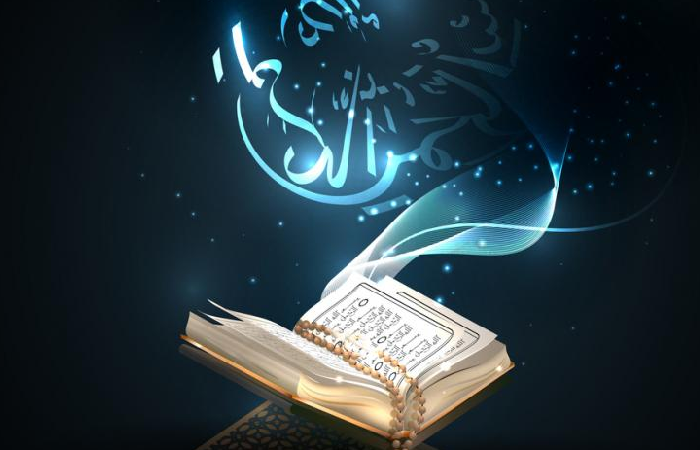
Sunnis adhere to one of four major schools of thought formed by intellectuals from the ninth to eleventh century, imams ibn Hanbal, abu Hanifa, Malek, and el-Shafei. These schools, known as the Hanbali, Hanafi, Maliki, and Shafei, are followed wholly or partially by various Muslim states.
The Sufi movement is a mystical strain of Islam that represents individuals' urge to transcend formal religious procedures in order to achieve higher levels of spiritual fulfillment. Sufism is reflected in all Islamic schools of thought and in all Muslim communities. It appeals to individuals and small groups due to its mystical, spiritual nature. It is neither a sect or school of philosophy, but rather a spiritual or transcendental practice.
Islamic Teachings:
Every Muslim is the receiver, protector, and executor of God's will on earth. A Muslim's duty to defend what is right is as much a part of his faith as his duty to resist what is wrong.
Ibada, or service to God through service to humanity, means living the faith.
You will not achieve righteousness unless you give (freely) of what you love; and whatever you offer, God knows it well.
Qur'an 3:92
The preservation of a social order is dependent on every member of society. In the setting in which it was initially revealed, Islam brought about a societal revolution.
The Qur'an uses concepts like equality, justice, fairness, brotherhood, and kindness to describe collective morality.
And to be firm and patient in times of pain (or suffering) and difficulty, as well as in times of panic. Such are the truth-seeking, God-fearing people.
Qur'an 2:177
For Muslims, the mosque is a place of worship and education. It is a shelter from the stresses of everyday life. Its purpose is best articulated by the Prophet himself, who said that the mosque should be a garden of paradise.
The renaissance of Islam is flourishing in every area of the world, and committed Muslims are working hard to meet modern-day issues while keeping true to their past beliefs.
Islamic Art:
There are numerous ways to define and explain Islamic art. These are the kinds of arts that Muslims have utilized to communicate with non-Muslims as well as Muslims. Film, movies, theater, Qawwaali, Naat, Nasheed, and poetry are all examples of Islamic art.
Many Islamic art projects are taking place across the Middle East, as well as among Muslim communities in Europe and the United States.
Islami Culture:
Islamic culture, often known as Muslim culture, refers to the historical cultural traditions that emerged among the diverse peoples of the Muslim world.
While not always religious in nature, these practices are generally influenced by aspects of Islam, especially because the religion served as an effective conduit for the inter-mingling of people from different ethnic/national backgrounds, allowing their cultures to come together on the basis of a common Muslim identity.
Islamic Calligraphy:
Islamic calligraphy is the creative practice of handwriting and calligraphy based on the alphabet used in Islamic culturally comparable cultures. Calligraphy from the Middle East, the Ottoman Empire, and Iran are included.
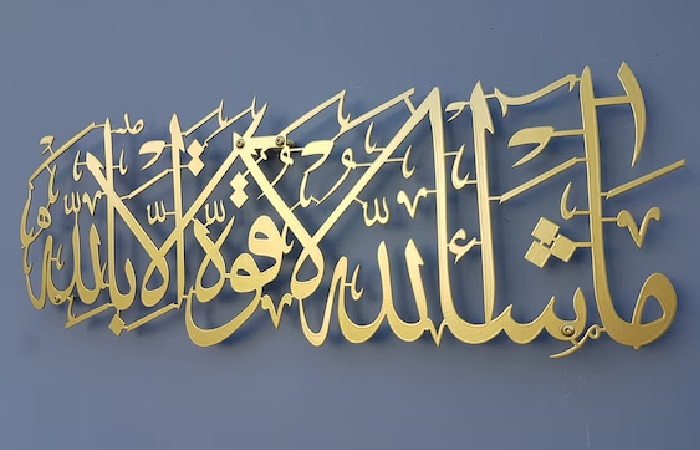
The Qur'an has had a profound impact on Islamic calligraphy's evolution.The chapters and fragments of the Qur'an are a common and practically universal text upon which Islamic calligraphy is based.
Islamic Architecture:
Islamic architecture refers to the various architectural styles linked with Islam. It includes secular and religious forms from Islam's early history to the present.

Early Islamic architecture was influenced by Roman, Byzantine, Persian, and all other lands acquired by Muslims in the seventh and eighth centuries.
Islamic architecture includes both secular and religious structures. It comprises large-scale mosques, fortresses, palaces, tombs, schools, and other public buildings, as well as smaller-scale fountains, public baths, and household constructions.
Islamic Music:
Islamic music can be related to religious music as played in Islamic public ceremonies or private devotions, or to musical traditions of the Muslim world more broadly.
The harmony of sound and powerful emotional expression were hallmarks of Arabic-Islamic music.
The popularity of Islamic pop musicians such as convert Yusif Islam — formerly known as Cat Stevens — who returned to the musical scene after a long silence and absence with religious pop is adored in the Middle East as well as among Muslim communities in the West.
Historical Perspective on Music in Islam
The "Islamic music" or "classical Islamic music" — originated as a "new art" with the advent of Islam around 610 CE. It developed from pre-Islamic Arabian music, with "important contributions" from Persians, Byzantines, Turks, Imazighen (Berbers), and Moors.
This music "is distinguished by a highly subtle organization of melody and rhythm," with "the vocal component predominating over the instrumental," no harmony, only "a single line of melody," and the individual performer "allowed, and indeed encouraged, to improvise. The main area where it can be heard runs "from the Nile valley to Persia," and the further one travels, "the less one finds undiluted Islamic music.
Historical Overview Of Music In Islamic Societies
The history of music in Islamic societies is a testament to the adaptability and innovation of Islamic culture. From its pre-Islamic roots to its contemporary expressions, Islamic music has served as a powerful medium for cultural expression, religious devotion, and social commentary.
There is a widespread misconception that music is generally prohibited in Islam. Such a prescriptive remark, however, elevates the question to one of faith.
The question's response is up to interpretation. The first persistent scholarly attack on music dates from the mid-tenth century and appears to have been in response to unlawful activity associated with music rather than the music itself.
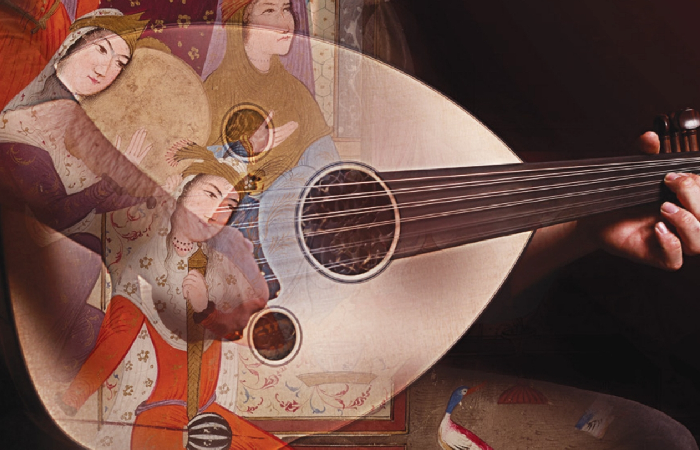
There is considerable disagreement about what exceptions to the prohibition on music can be imposed.
- Vocals but no instruments
- Vocals but only if the audience is of the same gender
- Vocals and drums
- Vocals and traditional one-sided drum and tambourine, but no other instruments. Any kind of music as long as it is not passionate, sexually suggestive
- Contains lyrics that violate Islam.
According to a minority number of Sunni Muslims and another group of Shiites, ladies playing the Daf at festivities and festivals can make an exemption to the prohibition of music.
This exemption is based on a well-known hadith in which two tiny girls were singing to a woman, and the Islamic Prophet Muhammad told Abu Bakr to let them continue, saying, "Leave them, Abu Bakr, for every nation has an Eid (i.e. festival), and this day is our Eid."
Yusuf al-Qaradawi's book "The Lawful and the Prohibited in Islam" claims that songs/singing are not haram unless:
-
The content of songs is "against Islamic teachings," such as celebrating liquor.
-
The "manner" of singing, such as "being accompanied by suggestive sexual movement," is forbidden.
-
It causes "excessive involvement with entertainment," such as squandering time that could be spent on religion.
-
If it "arouses one's passions, leads him towards sin, excites the animal instincts, and dulls spirituality" .
-
If the act is performed "in conjunction with haram activities - for example, at a drinking party".
Music has a long and diversified history in Islamic countries, spanning millennia and embracing a wide range of genres, instruments, and customs. While there is no one, definitive story of Islamic music's evolution, it can be broadly split into four major periods.
Pre Islamic Music:
The pre-Islamic Arabian Peninsula had a thriving musical culture that affected the evolution of Islamic music. This music was distinguished by its improvisational nature and usage of percussion instruments such as the tambourine and drums.
Early Islamic Period:
The arrival of new instruments and styles from Persia and Central Asia during the early Islamic period resulted in a confluence of musical traditions. The oud, a pear-shaped instrument, became a mainstay of Islamic music, and new vocal styles emerged.
Golden Age Of Islam:
The Golden Age of Islamic music was a time of immense cultural blooming. Music was an important part of courtly life and religious events. During this time, new musical forms such as qasidah (a type of ode) and mawal (a type of vocal improvisation) emerged. The birth of prominent composers such as Ziryab, led to the introduction of Persian music to Andalusia (Spain).
Post Golden Age:
Following the Golden Age, Islamic music evolved gradually, inspired by local traditions as well as European musical genres. During this time, new genres such as maqamat (a sort of modal music) and nasheed (a cappella religious music) emerged, as did the adaptation of Western instruments such as the piano and guitar.
Role Of Music In Classical Islamic Culture
Music has played a multifaceted role in classical Islamic culture. It serves as a means of religious expression, social commentary, and cultural entertainment.
-
From the intimate devotional music of Sufi mystics to the grand court orchestras of Muslim rulers, music has been a vibrant and diverse element of Islamic society that continues to enrich and inspire people to this day.
-
Classical Islamic music is the aristocratic music of the court and the upper class, which underwent development and modification in the hands of gifted musicians throughout several centuries.
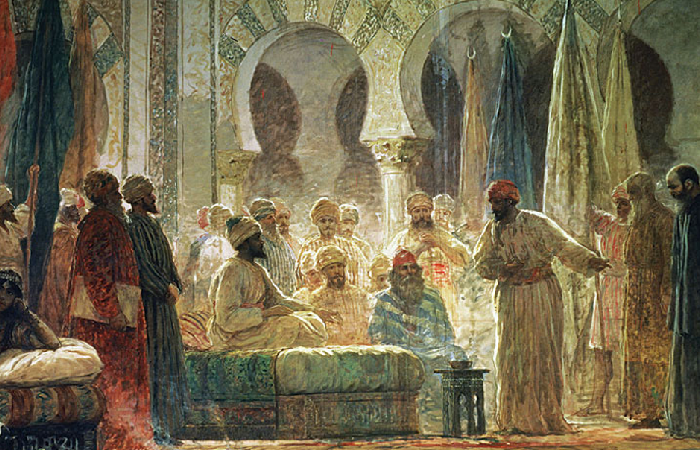
-
Rhythmic and melodic modes grew in number and complexity, and new vocal and instrumental genres arose. In addition, a body of theoretical works grew up, influencing both Islamic and—in some cases—European music. Its later popularization did not alter its intimate and entertaining character.
-
Music has long been used as a potent tool for spiritual communication with God in Sufism, Islam's mystical offshoot. Sufis believe that music can help to awaken the heart and mind, allowing them to connect with the divine more deeply.
-
Poets and musicians have utilized their work to express their dissatisfaction with social injustice, corruption, and other societal problems. This tradition of social critique may be traced back to pre-Islamic Arabia and has flourished throughout the centuries.
Islamic Scholarly Opinions On Music
Music is a topic that has sparked heated debate among historians both past and present. While many of them have generally condemned all forms of music, with the exception of ad-duff (tambourine) in weddings.
-
A number of them have taken a more positive stance, considering only music containing sensual, pagan, or unethical themes or subliminal messages to be categorically forbidden.
-
The latter viewpoint appears to be more compatible with Islam's overall nature, which is undeniably a comprehensive way of life that caters to all true human instincts and desires within acceptable boundaries.
-
Thus, to argue that all music is forbidden in Islam does not appear to be consistent with Islam's balanced approach.
-
The Qur'anic principle of "commanding right and forbidding wrong" (al-amr bi'l-maruf wa'l-nahy an al-munkar) has frequently targeted musical instruments, destroying forbidden instruments such as the ud and tunbur (respectively, the short- and long-necked lute) and the flute (mizmar) wherever they could.
It is narrated on the authority of Hazrat Ayesha Siddiqah and Hazrat Anas that the Prophet (Peace And Blessings of Allah be Upon Him) said:
Translation:
“There are two kinds of voices which have been cursed in this world and in the hereafter. One is the sound of singing in times of happiness, the other is the sound of sighing and wailing in times of trouble.”
Hazrat Ali (May Allah Be Pleased With Him) says that the Holy Prophet (Peace And Blessings of Allah Be Upon Him) said: I have been sent to break musical instruments.
This attitude has been expressed in modern times by the Wahhabis of Arabia, who burned stringed instruments during their occupation of Mecca in 1803, and, more recently, by the Taliban, who forbade instruments such as the piano, flute, and lute during their first period in power in Afghanistan (1996-2001).
Music opponents have allowed the tambourine (duff) to be played at weddings or religious festivities, as well as the singing of ascetic poems (zuhdiyyat) and the melodious reciting of the Quran.
Since the 1970s, even Islamist movements, including jihadist groups, have made extensive use of anashid, a kind of a cappella - religious chants, but they do not generally consider these to be "music."
The Sufis, or Islamic mystics, have been the most ardent supporters of music in Islam. The sama is an important part of their religious practice. This phrase, which literally means "listening," refers to ritual concerts in which devotional poems are chanted in a Sufi environment.
Typically, these songs are accompanied by a tambourine, as well as dancing. The Mevlevi order's whirling dervishes in Konya conduct the most famous Sufi dance.
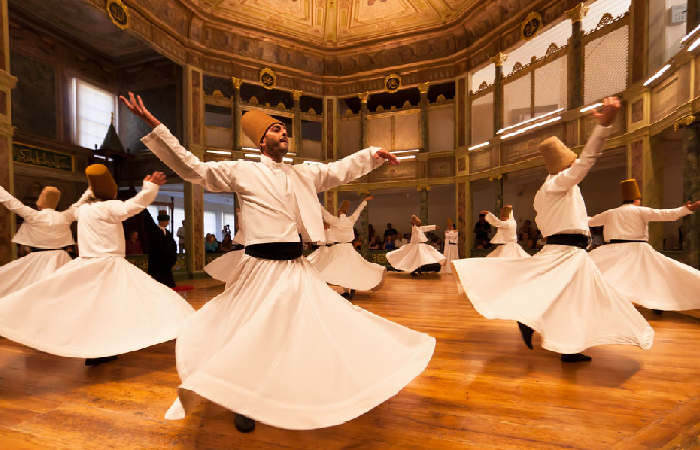
This is thought to represent the turning of the heavenly spheres and the ascension of the mystic's soul to the supramundane realm.
Sama is a type of "spiritual nourishment" that is intended to cause ecstasy (wajd) and thereby lead the individual into the presence of the divine.
Many Sufi authors spoke on the benefits of music as a type of psychological or medical therapy; as seventeenth-century Ottoman author Katib Celebi remarked, the Sufis used music in the same way that physicians used drugs.
They were drawing on a tradition that dated back to ancient Greek thought and was further developed in the Islamic world by practitioners of Greco-Arabic philosophy. Many of whom were intensely interested in music theory.
The four strings of the ud, according to the pioneering ninth-century Islamic scholar al-Kindi, related to the four elements (air, earth, fire, and water) and the four humours of the human body (blood, phlegm, black bile, and yellow bile).
As a result, when played in various combinations, they might be utilized to treat specific ailments or to improve specific character attributes. This notion remained in various regions of the Islamic world until the modern era.
Despite religious opposition, music had its roots and progress during the Muslim era. Muslim artists' creativity has had a significant impact on the advancement and elevation of music. In contrast, the West has both religious freedom and creativity. As a result, the trend of music in the West is considerably higher than that of Muslims, and there is a lot of effort on music art.
Here Are Some Islamic Scholars Viewpoints On Music:
Imam Abu Hanifa (699-767 CE): Another highly recognized early Islamic thinker, Abu Hanifa, had a more limited attitude on music. He felt that music was usually forbidden, although he made exceptions for some types of music, such as nasheed (religious chants).
Imam Malik (711-795 CE): Malik, one of the most revered early Islamic philosophers, believed that music was permitted as long as it was not utilized to encourage immorality or distract from religious requirements.
Imam Ibn Taymiyyah (1263-1328 CE): An ardent critic of music, Ibn Taymiyah was a renowned medieval Islamic scholar. Music, he thought, was a damaging and distracting kind of amusement that could lead to immorality.
Modern Perspectives on Music in Islam
The name music, or musiqa, derives from the ancient Greek language, which is translated as ghina in modern times.
In Islamic Jurisprudence, however, there is a fundamental difference between the two. While ghina is limited to chants, rhymes, folk songs, poetry, and so on that are tuned to a melody. Musiqa expressly refers to the sound created by musical instruments to compose beats, rhythms, and notes that may or may not contain singing.
Music is frequently defined as an art form that expresses thoughts and emotions through rhythm and harmony. This notion lends music a sense of universality, immortalizing it across racial and linguistic borders. As an art form, it represents various things to different people.
Music's vibrating sound patterns release a neurotransmitter called dopamine, which causes the body to experience a "feel-good" sensation. To obtain more effective results, some therapies incorporate musical interventions into typical talk therapy procedures.
Music In Islam
Music is one of the world's major fitna (trials) for the Muslim Ummah. The subject of its legality is a point of contention among academics, particularly in the modern era. The majority of scholars and muftis have issued the fatwa that listening to music is haraam (prohibited) based on evidence from the Quran and the Sunnah of Prophet Muhammad (SAWS).
According to Abu Amir (RA), the Prophet (SAWS) said, "Among my followers will be some who consider illegal sexual intercourse, the wearing of silk, the drinking of alcoholic drinks, and the use of musical instruments to be lawful..." Hadith 16 (Sahi Al-Bukhari, Book 74).
This Hadith expressly declares that music is forbidden
"And of the people is he who buys idle speech to mislead others from the way of Allah without knowledge and who takes it in ridicule,"
Allah (SWT) says of those who engage in such behaviors. Those who do so will face a humiliating punishment." (Quran 31:6).
Ibn Mas'ood (RA), a Companion of the Prophet (SAWS) and a Fiqh expert, interpreted the verse's word "idle speech" as singing, and his interpretation is confirmed by prominent Companions such as Ibn Abbas, Ibn Umar, and Jabir bin Abdullah (may Allah be pleased with them).
Present Muslim Scholars View On Music.
-
Reciting and listening to Nasheeds is acceptable, according to leading scholars such as Shaykh Uthaymeen, Ibn Ba'az, and Albani (may Allah have mercy on them).
-
Nasheed is an Arabic term that means "raising one's voice with poetry," "beautification of the voice," and "fine poetry."
-
They are frequently formed of verses honoring the Lord and praising Islam, which serve to inculcate virtuous beliefs and the avoidance of immorality.
Some academics consider music to be haram. They claim that today's modern music conveys negative signals and concepts that lead to undesirable behavior. As a result, it should be avoided as it may lead to the commission of a haram act.
Zakir Naik, is a well-known Islamic scholar and President of the Islamic Research
According to him, there is no explicit word in the Quran that prohibits listening to music. However, numerous hadith forbid listening to music or playing musical instruments.
He says that, certain instruments, such as the tambourine, are halal as stated in hadith.
According to Mufti Menk, certain genres of music are safe, however this does not include modern music.
In contrast, the Sufis place music at the core of the Sama, a ceremony of spiritual song and singing.
The Sama's aim is to provide the conditions for the human soul to experience divine love. The music, which is transcendent and ecstatic, instills in the listener an overwhelming love for God.
Concept Of Music And Sound As Per Sufi Ways:
As per the sufi ways Music is not allowed . But they hold a great significance for sound and vibration.
Beautiful Nasheeds Zikar and Salawaats are not categorised as music
Music according to them is the sounds made by heavy metals and that of the rap. These sounds neither glorifies the Divine nor makes the person to think of the Divine.
-
The sounds and vocals which are recited to glorigy the Divine are called prasings.
-
Songs are recorded on frequencies that agitates the heart. These frequencies are not beneficial for the heart and they do not bring about spiritual awakening. Such sounds lower our frequencies'
As per these teachings, Humans exist because of the sound they are eminating. This sound is making energy and energy is making light and that light is manifesting and creating your form.
-
Satan tries to destroy the form by destroying the source of this light and thus plays such sounds which lower our vibrations and thus we lose our light.
-
Sound is immensely proweful, As Quran itself states that Allah Azzawajal has destroyed previous civilizations with just one shout.
-
It is also easy for a person to become insane or possessed if their frequencies are lowered.
Therefore sufi teachings believe in circles of paradise to increase a persons frequency. As soon as you sit for zikr, salawaats or recite quran , your vibrations become heavenly and these angelic vibrations destroy the demonic vibes and make a person holy.
-
As per the Holy Quran everything is in praise for Allah Azzawajal and humans are ordered to praise and do zikr as well.
-
As such it is prohibited to listen to sounds and music which destroy the heart , destroy the body and destroy the being.
Modern Perspective Of Music
Modern views on music in Islam are complicated and diverse, reflecting the changing socio-religious milieu and continuous scholarly interpretations. While some people strictly prohibit music, others accept it with restrictions.
Online platforms and social media enable conversations and varied perspectives on music in Islam, challenging old interpretations and encouraging a more nuanced understanding.
The Rise Of Awakening
Awakening began in 2000 as a publishing firm, with the initial project being a biography of the Prophet Muhammad. Friends Sharif Banna and Wali-ur Rahman formed it in London, and it was later joined by Bara Kherigi and Wassim Malak. They were Sunni Muslim young men with a strong interest in Islamic Studies, and a couple of them had official qualifications. All shared the goal of improving the quality of Islamic media goods by releasing high-quality Islamic literature.

The Awakening of Islamic Pop Music by Jonas Otterbeck, Professor of Islamic Studies at the Aga Khan University's Institute for the Study of Muslim Civilisations in London, focuses on the formation of this musical genre and its repercussions on contemporary Islam. Otterbeck investigates the rise of Islamic pop by narrating the tale of Awakening, the company that signed Yusuf and later other Muslim pop hitmakers.
Because Awakening has solely signed male artists to date, Otterbeck claims that the style and substance of artists like Yusuf can be viewed as carefully crafted embodiments of "ethical masculinity."
This concept relates to the expectation that artists will create content that adheres to traditional Islamic teachings and will reflect a "proper" Islamic image in their onstage personas and daily interactions. Other Awakening artists with similar styles include the Lebanese-Swedish Maher Zain, the Egyptian-American Raef, the Turkish-Macedonian Mesut Kurtis, the Kuwaiti Humood AlKhuder, and the Libyan Ali Magrebi.
Certain Islamic scholars believe, drums are permitted but not wind or string instruments, and only female voices are forbidden, which explains Awakening's focus on signing only male performers thus far.
Modernity And Cultural Diversity Has Influenced Islamic Perspectives On Music
-
Islamic pop music allows Muslims in a variety of circumstances to manage the secular and religious sides of their lives with greater confidence and less apologetic attitude!
-
It has had a significant impact on the development of current Islamic expressions. I would add that this impact has varying consequences depending on the political circumstances. This growth is also influenced by other cultural trends such as modest dress, literature, television, and theater.
-
A knowledge of contemporary Islam is consequently inadequate without a closer examination of how popular culture and the creative arts are reshaping it from inside.
-
The spread of media, particularly the internet, has made music available to everyone. This has introduced Muslims to a variety of musical styles and challenged traditional views on the significance of music in society.
-
Modern nations are becoming more secular, resulting in the separation of religion and public life. This has influenced how Muslims perceive music, with some feeling more comfortable embracing previously regarded unsuitable musical forms.
-
Individual choice and liberty are valued in modern society. This has enabled Muslims to construct their own interpretations of religious texts and musical traditions.
-
Regional cultures' impact has resulted in the formation of distinct Islamic music genres such as Qawwali in South Asia, Rai in North Africa, and the thriving music scenes of Indonesia and Turkey.
Modernity and cultural variety have had a significant impact on how Muslims perceive and participate with music. While problems persist, the landscape is shifting toward a more nuanced and welcoming view of music within the Islamic faith. The future of Islamic music looks bright and diversified, reflecting the rich tapestry of Muslim communities around the world.
The Role of Instruments in Islamic Music
Instruments play a complicated and multidimensional role in Islamic music, It is impacted by religious interpretations, cultural circumstances, and historical changes. While opinions on the permissibility of instruments differ, they clearly play an important role in developing the rich tapestry of Islamic musical traditions around the world.
The Daf, Tambourine and Oud are the traditional instrument which are played in islamic music
Islamic Views On The Use Of Musical Instruments.
The following Hadith are worth mentioning with regard to music and use of modern musical instruments:
"One who plays music in the house for forty days will be beset by a satan named Fogander," declared Imam Jafar Sadqiue (AS).
Allah will have Satan occupy every portion of that person's body. When this happens, he will be free of shame and will not care what he says or what others say about him. Then the Devil would blast on him, and his modesty would be entirely gone. Then he would not be humiliated, even if his women's virginity was violated."
The Messenger of Allah (saww) once said, "the playing of violin cause hypocrisy to grow in the heart, in the same way as water becomes the cause of the growth of greenery."
"Angels do not enter houses with wine, drums, tambourines, or flutes," remarked Imam Ali (AS). Even the innovations of that house's occupants are not appreciated, and their fortunate benefits are taken away."
"That person in whose house is kept for forty days a drum' flute or any other musical instrument chess or similar things that person invokes Allah's wrath & if that person dies during those forty days his death shall be of a transgressor & a libertine," stated Imam Ali Reza (AS). His dwelling place will be Hell, and what a terrible dwelling place that is."
The Holy Prophet (saww) said, "A person who sings will be put in the group of those people on whom Allah will not look with grace, on the Day of Judgment."
Musicians Fate
The Holy Prophet (saww) stated, "The person possessing agiler will be brought on the Day of Judgment with a black face, a guitar of fire in his hand, and seventy thousand angels above him, all carrying fire maces." They would strike the maces on that person's head and face, and the singer would rise from his tomb blind, deaf, and dumb, and the adulterer would likewise resurrect in this manner. And the one who plays the flute, as well as the one who plays the drum, should be similarly exalted."
The above Tradition clearly demonstrates that all those who engage in singing, committing adultery, or playing musical instruments will be gathered on the Day of Judgment as Deaf, Dumb & Blind

Music in Contemporary Islamic Societies
Music serves many functions in modern Islamic civilizations and is culturally and spiritually vital. While there are numerous viewpoints on music's permissibility within Islam, it has emerged in a variety of forms, genres, and circumstances throughout the Muslim world.
Beginning of the early nineteenth century saw the development of interactions and relationships with Western music. This had an impact on Islamic music as well. The increased exposure to Western music led to changes in traditional musical styles.
Music started becoming an important part of Muslim daily life in many parts of the world. It is used for a variety of purposes. These include religious observance, cultural expression, and entertainment.
Religious Observations:
*Adhan:* The adhan is the call to prayer pronounced five times a day by a muezzin. It is a lovely and emotive piece of music that Muslims all across the world are familiar with.
Nasheeds: They are religious melodies that are frequently used to glorify Allah or the Prophet Muhammad.

Nasheeds are primarily a cappella, but some use instruments.
Qawwali: Qawwali is a Sufi devotional music tradition from South Asia.
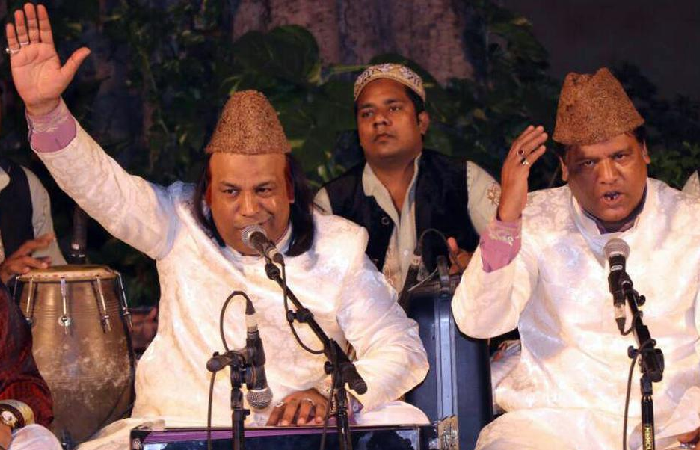
It is distinguished by its fast-paced rythms and impassioned singing.
Entertainment:
Islamic Pop Music: Muslims enjoy popular music as well. Many Muslims enjoy listening to pop music from their home nations as well as from other countries throughout the world.
Music Festivals: There is an increasing number of music festivals geared for Muslim audiences. These festivals cover a wide range of musical genres, from traditional to contemporary.
Emerging Trends Of Music Within The Muslim Community.
Music is becoming more popular among Muslim communities, particularly among young people.
-
This is attributed to the growing popularity of Islamic music genres such as Nasheed and Sufi music. As well as increased exposure to Western music through the internet and globalization.
-
Artists and groups are embracing technology to promote Islamic music by creating online platforms for sharing music, smartphone apps for listening to Islamic music, and social media interactions with fans. This is making Islamic music more accessible to individuals all throughout the world.
-
Music is seen as a way to express one's faith, interact with the community, and promote Islamic ideals. As a result, funds for Islamic music education and initiatives are becoming more available.
The Muslim community's opinion of music is changing, with a growing acceptance of music and a deeper respect for its significance in Islamic culture. As a result, the landscape of Islamic music is becoming more dynamic and diverse.
Diverse Opinions and Personal Choice
For centuries, music has been a source of contention within Islam, with differing readings of holy texts and changing social situations leading to a range of opinions among Muslims worldwide.
-
Muslims see few contradictions between their faith and modern living. Most people believe it is possible to be a faithful Muslim and live in a modern society.
-
Many reject the notion that religion and science are inherently antagonistic. Indeed, most Muslims claim to believe in evolution.
-
Imports of Western and Indian popular culture, on the other hand, provoke conflicting emotions among the world's Muslims.
-
While many Muslims claim they enjoy Western music, movies, and television, the majority of Muslims also feel that Western popular culture has harmed morality in their country.
Some scholars point to particular Quranic and Hadith texts that allude to "frivolous talk" (lahw al-hadith) and denounce musical instruments as "instruments of frivolity." This point of view emphasizes the potential for music to divert attention away from spiritual pursuits and piety.
Arguments for Music Prohibition:
Moral Corruption: Some music is viewed as inciting immoral behavior, such as drinking and adultery, and as potentially leading to societal ruin.
Cultural Interpretations and behaviors: Music has historically been associated with pagan rituals and behaviors that are incompatible with Islamic faith in various locations.
Arguments In Favour:
Modern experts recognize music's pervasiveness in society and seek methods that encourage healthy involvement with it. They encourage Muslims to critically evaluate music and select music that reflects Islamic ideals.
Music has always been employed in religious situations, such as Sufi ceremonies and devotional hymns, according to supporters. This implies that music can be used for spiritual development as well as cultural expression.
Personal choice of people:
Despite the ongoing debate, music is becoming more popular in Muslim communities. It is mainly gaining fame among younger people. This is because of the growing popularity of Islamic music genres such as Nasheed and Sufi music, as well as more exposure to Western music via media and globalization.
Individual Muslims can navigate this topic based on their particular faith and cultural background. Some people choose to avoid music entirely, while others find ways to include music into their life in ways that are consistent with their religious beliefs.
Conclusion
The main aim of the blog was to highlight the views of islamic scholars in the light of quran and hadith on music in islam.
-
we have discused about various Ahadees which regard music as haram but regard devotional music that increases ones spirituality as permissible.
-
The impact of modernism and western influence as well as emerging trends of islamic pop are also discussed.
-
The dispute over music in Islam is complicated and multidimensional, reflecting the Muslim community's diversity of thinking and practice.
-
While some people strictly restrict music, others see it as a form of personal expression, cultural legacy, and spiritual connection. Individual Muslims must ultimately decide whether or not to engage with music.
-
The growing acceptance of music inside Muslim communities, particularly among younger generations, indicates that the landscape of Islamic music is likely to shift in the coming years.
To sum up Islamic music has the ability to reach a wider audience and make a substantial contribution to global music as artists experiment with fusion genres and technology gives new channels for sharing music.
References and Further Reading
al-Faruqi, Lois Ibsen. “Music, Musicians and Muslim Law”, Asian Music 17, no. 1 (Autumn - Winter, 1985): 3-36.
Nasr, Seyyed Hossein. “Islam and Music: The Legal and Spiritual Dimensions”
Enchanting Powers: Music in the World's Religions, edited by Lawrence Eugene Sullivan, 219-235. Cambridge, MA: Harvard University Press, 1997.
Numān, Abū Ḥanīfah ibn Muḥammad. The Pillars of Islam: Daā'im al-Islām, translated by Asaf Ali Asghar Fyzee and Ismail Kurban Husein Poonawala. 2 vols. Oxford: Oxford University Press, 2002.
Qaradawi, Yusuf. Diversion and Arts in Islam, Translated by Rawah el-Khatib. Islamic Inc, n.d.
Shiloah, Amnon. Music in the World of Islam: A Socio-Cultural Study, Detroit: Wayne State University Press, 1995.
Shiloah, Amnon. “Music and Religion in Islam”, Acta Musicologica 69, no. 2 (Jul. - Dec., 1997): 143-155.
The Awakening of Islamic Pop Music (2021) By Jonas Otterbeck, Aga Khan University
https://quran.com/
https://sunnah.com/
http://www.islamic-laws.com/musicanditseffect.htm
https://madinahmedia.com/is-music-haram/
https://ecommons.aku.edu/uk_ismc_series_volumes/6/
https://www.aku.edu/ismc/people/Pages/jonas-otterbeck.aspx
https://edinburghuniversitypress.com/jonas-otterbeck/
https://www.awakening.org/
https://nurmuhammad.com/
https://nurmuhammad.com/app/
https://sufilive.com/







